Abstract
In cognitive science, lexical decision task is used to investigate visual word recognition and lexical access. The issue of whether or not individuals who are depressed differ in their access to affectively laden words and specifically to words that have negative affect was examined. Based on some aspects of the Resource Allocation Model (Ellis), it was postulated that patients suffering from depression take more time to recognize items from an affective-loaded list. In order to compare their behavior in a lexical decision task, patients suffering from depression and healthy controls were studied. We hoped to find an interaction between the mood state of subjects and the categories (affective or neutral) of words. Two groups of right-handed adults served as subjects in our experiment. The first group consisted of 11 patients suffering from depression (mean age: 40.2; sd: 6.8). All of this group met the DSM-III-R and the Research Diagnostic Criteria for major depressive disorder. Severity of their disease was rated using the 24-item Hamilton Depressive Rating Scale. All patients suffering from depression were without psychotropic medication. The control group was composed of 24 subjects (mean age: 32.7; sd: 7.9). A depressive word-list and a neutral word-list were built and a computer was used for the lexical-decision task. A longer reaction time to detect the non-word stimuli (F1,33 = 11.19, p < 0.01) was observed with the patients by comparison to the normal subjects. In the analysis of the word stimuli, a group by list interaction (F1,33 = 7.18, p < 0.01) was found.(ABSTRACT TRUNCATED AT 250 WORDS)
Full text
PDF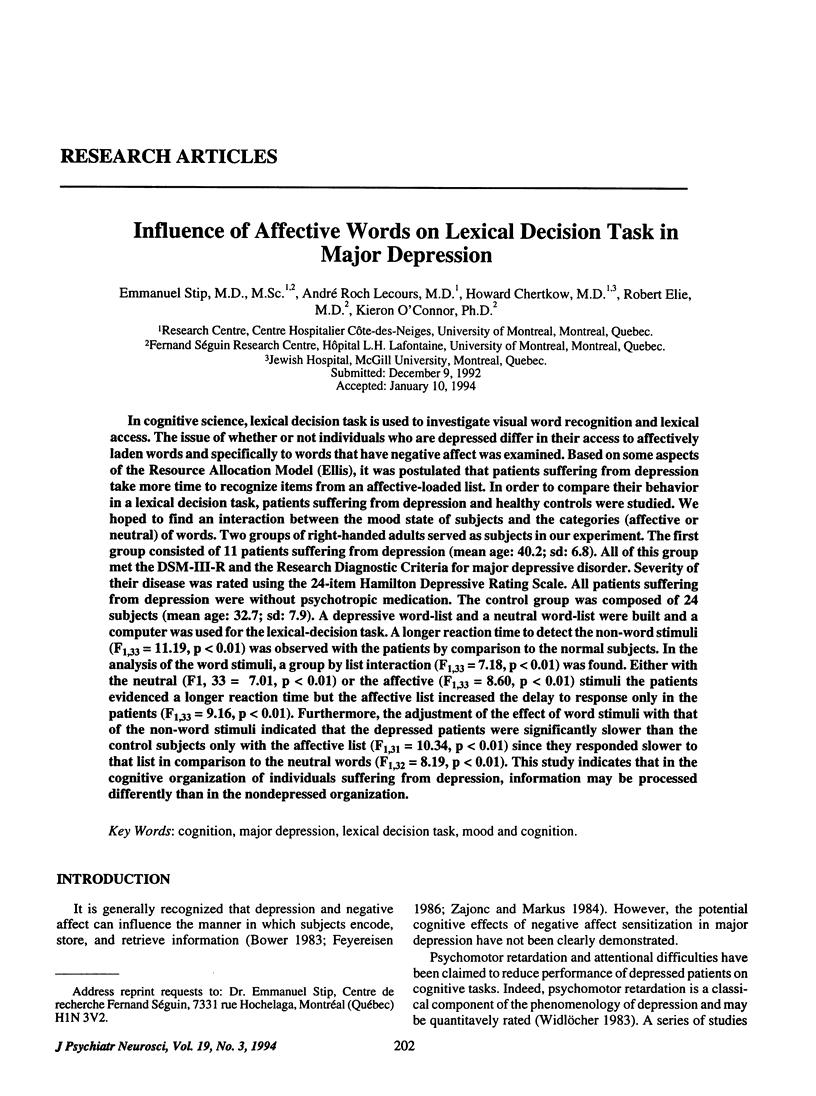
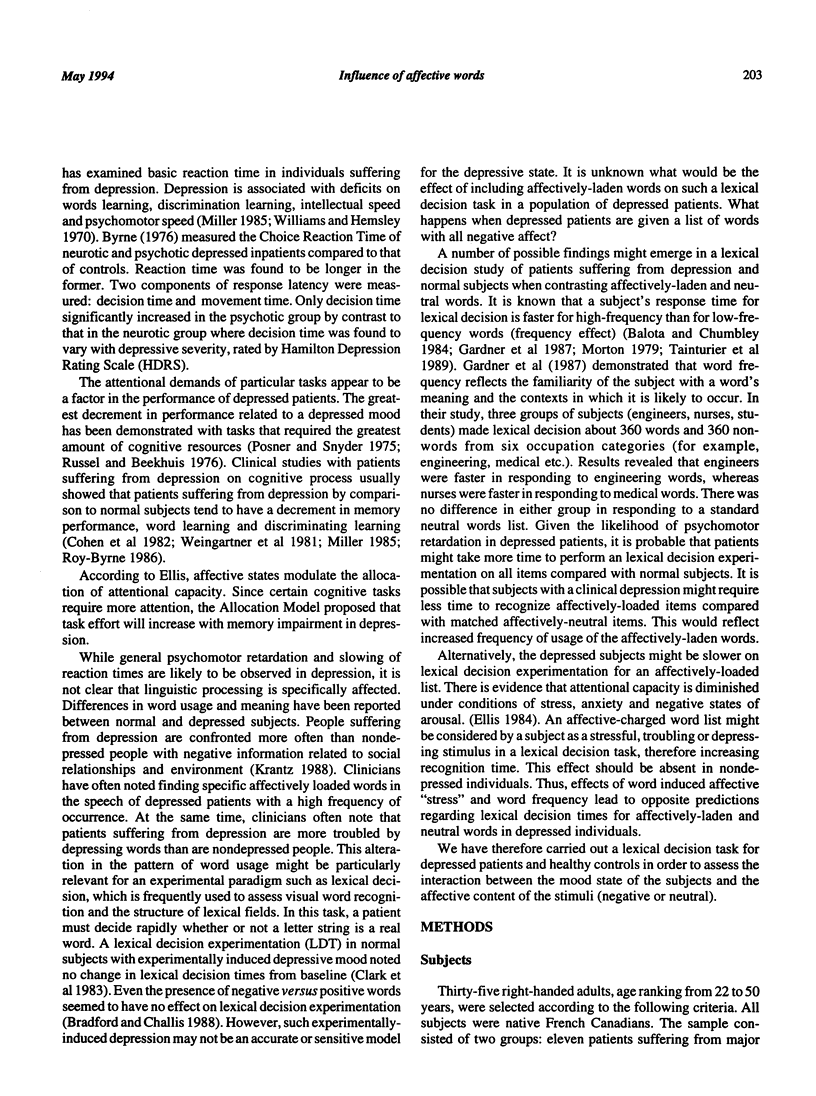
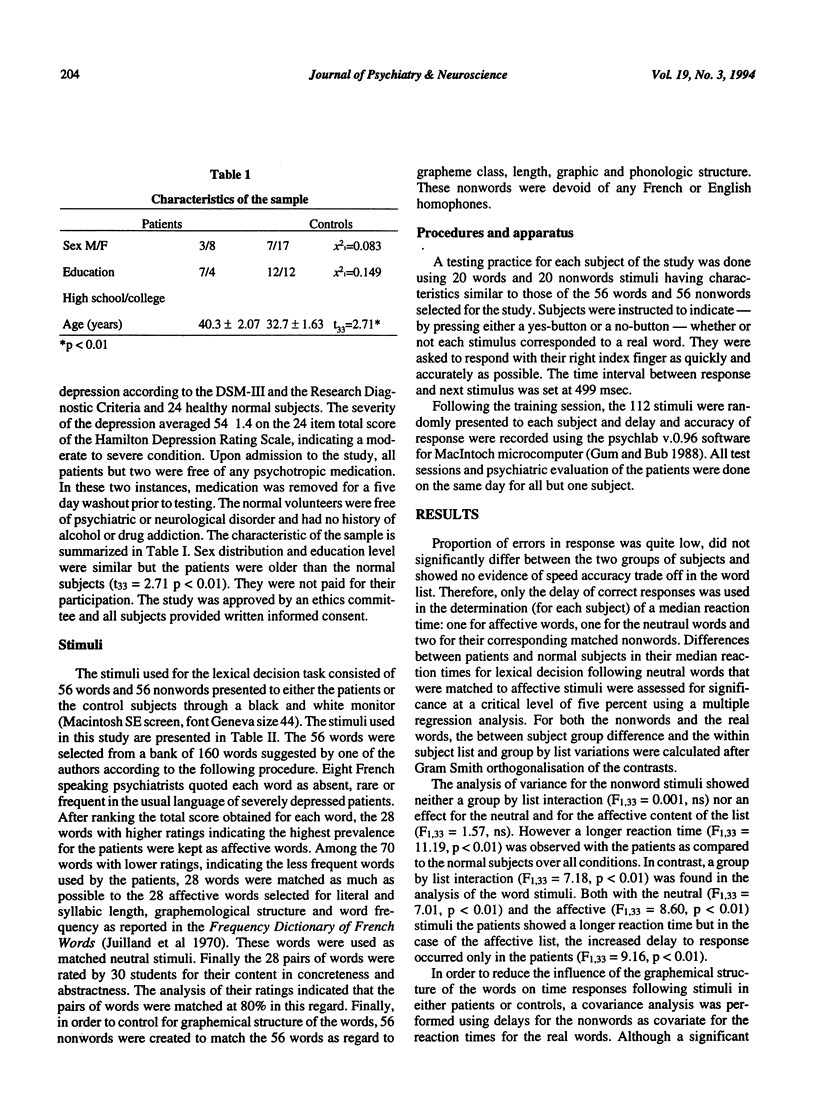
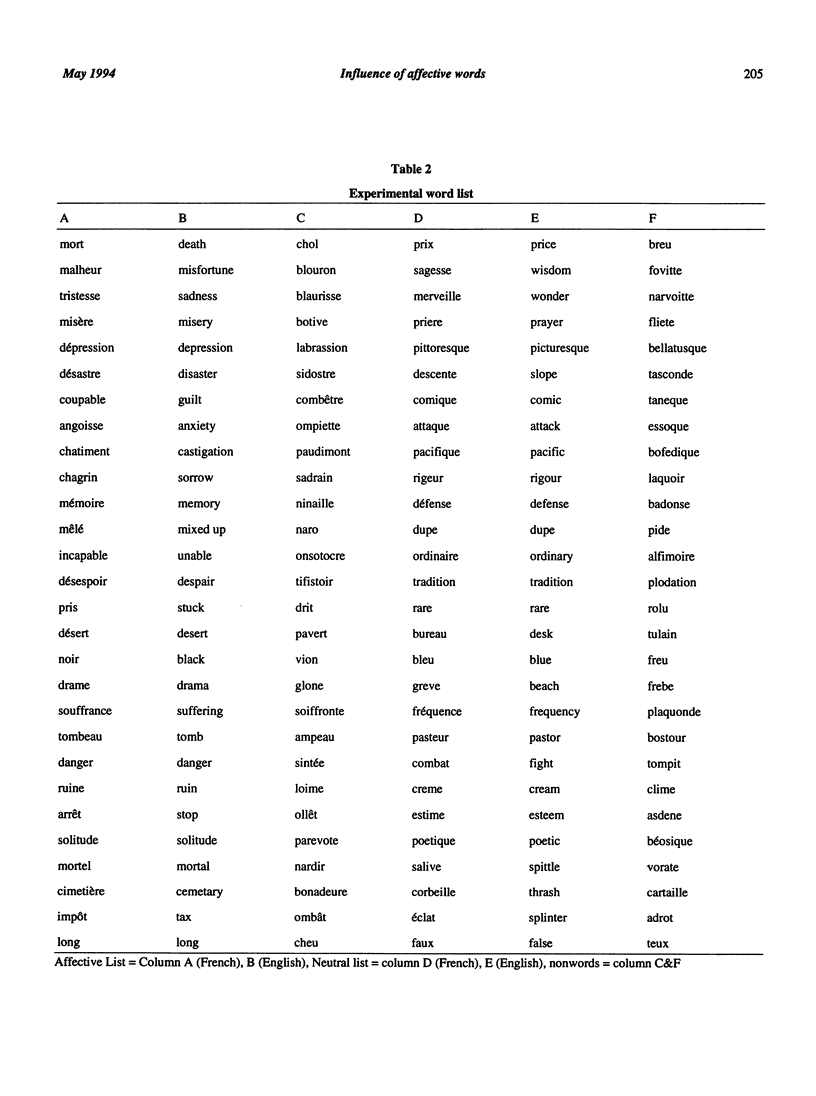
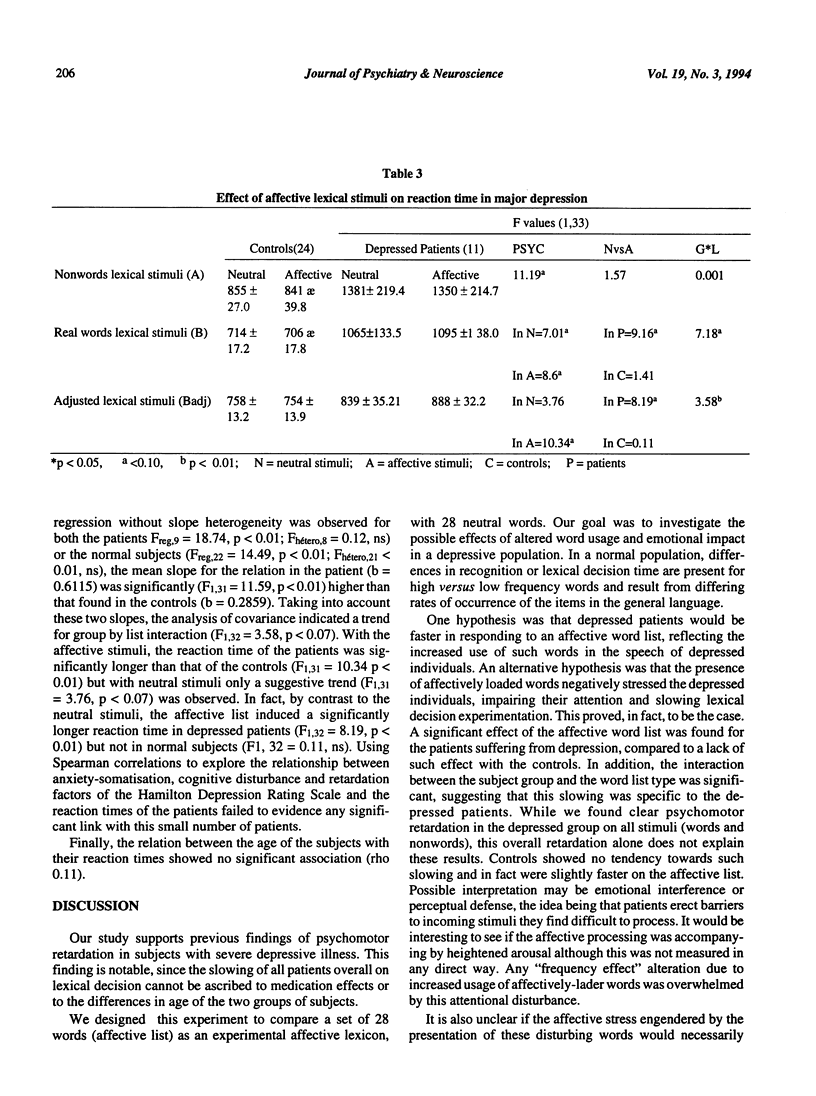
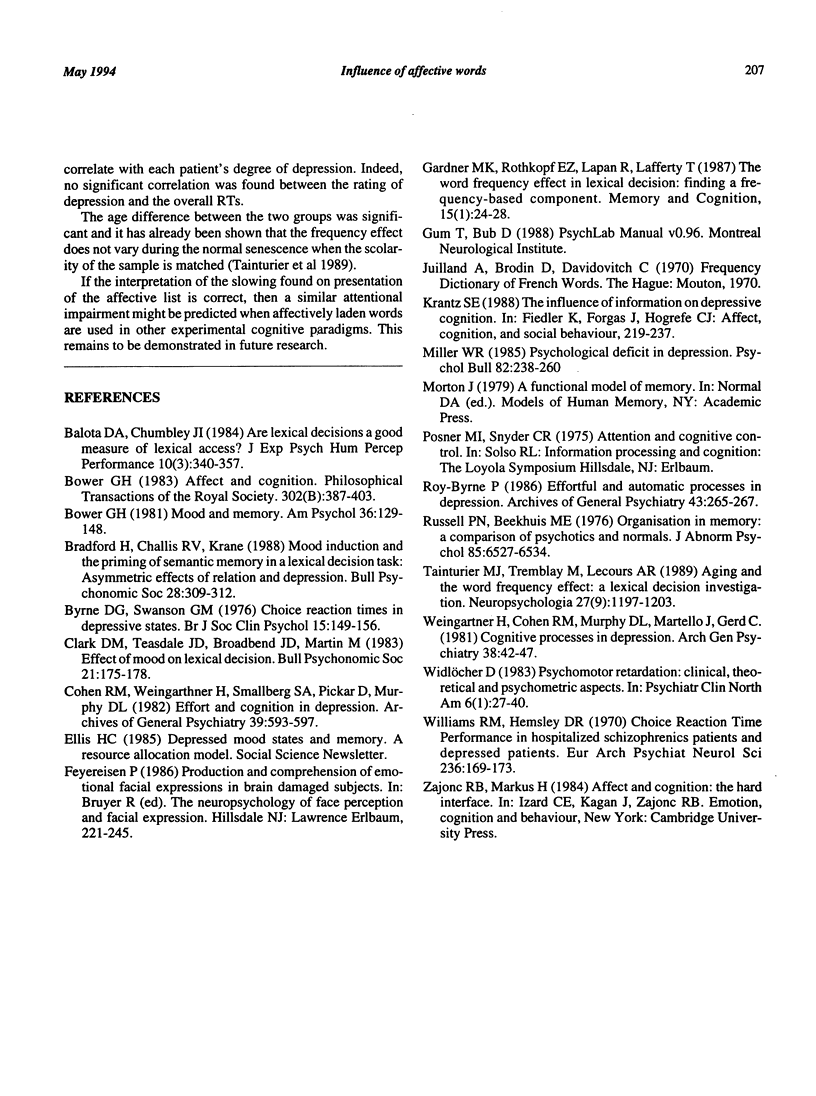
Selected References
These references are in PubMed. This may not be the complete list of references from this article.
- Balota D. A., Chumbley J. I. Are lexical decisions a good measure of lexical access? The role of word frequency in the neglected decision stage. J Exp Psychol Hum Percept Perform. 1984 Jun;10(3):340–357. doi: 10.1037//0096-1523.10.3.340. [DOI] [PubMed] [Google Scholar]
- Bower G. H. Mood and memory. Am Psychol. 1981 Feb;36(2):129–148. doi: 10.1037//0003-066x.36.2.129. [DOI] [PubMed] [Google Scholar]
- Byrne D. G. Choice reaction times in depressive states. Br J Soc Clin Psychol. 1976 Jun;15(2):149–156. doi: 10.1111/j.2044-8260.1976.tb00020.x. [DOI] [PubMed] [Google Scholar]
- Cohen R. M., Weingartner H., Smallberg S. A., Pickar D., Murphy D. L. Effort and cognition in depression. Arch Gen Psychiatry. 1982 May;39(5):593–597. doi: 10.1001/archpsyc.1982.04290050061012. [DOI] [PubMed] [Google Scholar]
- Gardner M. K., Rothkopf E. Z., Lapan R., Lafferty T. The word frequency effect in lexical decision: finding a frequency-based component. Mem Cognit. 1987 Jan;15(1):24–28. doi: 10.3758/bf03197709. [DOI] [PubMed] [Google Scholar]
- Miller W. R. Psychological deficit in depression. Psychol Bull. 1975 Mar;82(2):238–260. doi: 10.1037/h0076367. [DOI] [PubMed] [Google Scholar]
- Roy-Byrne P. P., Weingartner H., Bierer L. M., Thompson K., Post R. M. Effortful and automatic cognitive processes in depression. Arch Gen Psychiatry. 1986 Mar;43(3):265–267. doi: 10.1001/archpsyc.1986.01800030083008. [DOI] [PubMed] [Google Scholar]
- Tainturier M. J., Tremblay M., Lecours A. R. Aging and the word frequency effect: a lexical decision investigation. Neuropsychologia. 1989;27(9):1197–1203. doi: 10.1016/0028-3932(89)90103-6. [DOI] [PubMed] [Google Scholar]
- Weingartner H., Cohen R. M., Murphy D. L., Martello J., Gerdt C. Cognitive processes in depression. Arch Gen Psychiatry. 1981 Jan;38(1):42–47. doi: 10.1001/archpsyc.1981.01780260044004. [DOI] [PubMed] [Google Scholar]
- Widlöcher D. J. Psychomotor retardation: clinical, theoretical, and psychometric aspects. Psychiatr Clin North Am. 1983 Mar;6(1):27–40. [PubMed] [Google Scholar]
- Williams R. M., Hemsley D. R. Choice reaction time performance in hospitalized schizophrenic patients and depressed patients. Eur Arch Psychiatry Neurol Sci. 1986;236(3):169–173. doi: 10.1007/BF00380945. [DOI] [PubMed] [Google Scholar]


